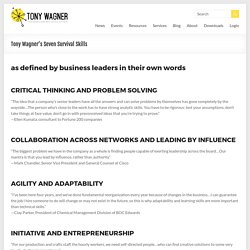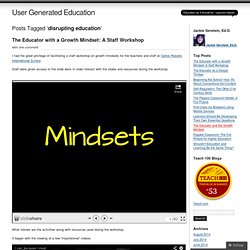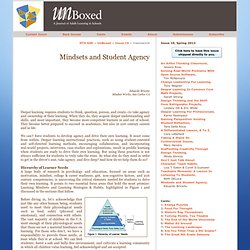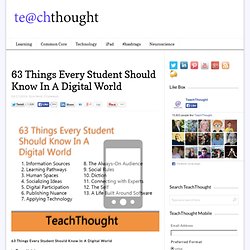

Tony Wagner’s Seven Survival Skills. “The idea that a company’s senior leaders have all the answers and can solve problems by themselves has gone completely by the wayside…The person who’s close to the work has to have strong analytic skills.

You have to be rigorous: test your assumptions, don’t take things at face value, don’t go in with preconceived ideas that you’re trying to prove.” —Ellen Kumata, consultant to Fortune 200 companies “The biggest problem we have in the company as a whole is finding people capable of exerting leadership across the board…Our mantra is that you lead by influence, rather than authority.” —Mark Chandler, Senior Vice President and General Counsel at Cisco “I’ve been here four years, and we’ve done fundamental reorganization every year because of changes in the business…I can guarantee the job I hire someone to do will change or may not exist in the future, so this is why adaptability and learning skills are more important than technical skills.” The Other 21st Century Skills. Schooling and institutionalized education have become removed from true, instinctual, and human/humane learning.

Humans have been learning since the beginning of time with major discoveries and innovations historically and currently emerging in spite of school. This is the biggest problem I have with schools – most are contrived and coercive and do not honor the innate human need and desire to learn, discover, and evolve. If order to fully understand the purpose of school, the history of its evolution as an institution needs to be understood.
What follows is part of A Brief History of Education in the Freedom to Learn series published in Psychology Today: If we want to understand why standard schools are what they are, we have to abandon the idea that they are products of logical necessity or scientific insight. From the Time Magazine article, How to Bring Our Schools Out of the 20th Century I have never let my schooling interfere with my education. Like this: Like Loading... Snapshot of a Deeper Learning Classroom: Aligning TED Talks to the Four Cs. Edutopia is pleased to premiere the first blog in a new series designed to showcase compelling examples of how students are developing 21st century skills through a deeper-level of learning.
Through this blog series, we hope to increase awareness and encourage replication of successful models. Chris Anderson, TED curator. (Photo credit: Pierre Omidyar via Wikimedia Commons) As many of my readers know, this year I have been dedicated to using the 21st Century four Cs. The four Cs are a rubric of sorts that help align lessons to more reality-based learning and assessing. As I design a lesson or assessment, I ask myself if what I've designed, or what the students must master, correlates to the important skills of: CollaborationCommunicationCritical ThinkingCreativity My lessons and tests must incorporate one or more of of the four Cs to, in my opinion, be worthy of spending precious instructional time in the classroom. ProcessEnvironmentContentProduct An example of this is my TED Talks unit. Mindsets and STudent Agency.
Deeper learning requires students to think, question, pursue, and create—to take agency and ownership of their learning.

When they do, they acquire deeper understanding and skills, and most important, they become more competent learners in and out of school. They become better prepared to succeed in academics, but also in 21st century careers and in life. We can’t force students to develop agency and drive their own learning. It must come from within. Deeper learning instructional practices, such as using student-centered and self-directed learning methods, encouraging collaboration, and incorporating real-world projects, interviews, case studies and explorations, result in prolific learning when students are ready to drive their own learning. Before diving in, let’s acknowledge that just like any other human being, students need to meet their physiological needs such as food, safety (physical and emotional), and connection with others. A growth mindset can be learned.
FINAL-Deeper-Learning-Infographic. Deeper Learning Video Series. 63 Things Every Student Should Know In A Digital World. 63 Things Every Student Should Know In A Digital World by Terry Heick It could be argued—and probably argued well—that what a student fundamentally needs to know today isn’t much different than what Tom Sawyer or Joan of Arc or Alexander the Great needed to know.

Communication. Resourcefulness. Creativity. Persistence. How true this turns out to be depends on how macro you want to get. But in an increasingly connected and digital world, the things a student needs to know are indeed changing—fundamental human needs sometimes drastically redressed for an alien modern world. Of course, these are just starters. The Changing Things They Need To Know: 13 Categories & 63 Ideas Information Sources 1. 2. 3. 4. Learning Pathways 5. 6. 7. 8. Human Spaces 9. 10.